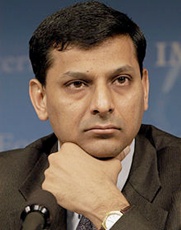Extreme monetary easing will unsettle financial markets: RBI chief
28 May 2014
Reserve Bank of India governor Raghuram Rajan has raised concerns over the way central bankers of major economies are collectively engaged in extreme monetary easing through unconventional policies.
 These policies, he said have brought unsustainable buoyancy to financial markets at a time when the world seems to be struggling back to its feet after the great financial crisis, he pointed.
These policies, he said have brought unsustainable buoyancy to financial markets at a time when the world seems to be struggling back to its feet after the great financial crisis, he pointed.
"The current non-system in international monetary policy is, in my view, a source of substantial risk, both to sustainable growth as well as to the financial sector," Rajan said in the text of a speech to be delivered at the Bank of Japan in Tokyo.
"It is not an industrial country problem, nor an emerging market problem; it is a problem of collective action. The sooner we recognize that, the more sustainable world growth we will have," he said, reiterating comments he made earlier this month.
He said global central banks have to be mindful of the impact of their unconventional monetary policy measures on other economies. To mitigate any ill-effects of monetary easing on other economies, Rajan proposed that central banks of advanced nations "internalise" the spillover effects.
But, such internalisation of spillover effects of unconventional policies would become feasible only when domestic commercial banks are willing to accumulate significant central bank reserves without question. But this can happen only under situations where lending becomes unattractive because of debt overhang, structural problems, or simply weak demand. But, such a situation may be a long time coming, if at all, he said.
''The consequences of these sustained unconventional policies pile up in the financial markets, where risk taking increases, without necessarily increasing real investment or consumption. And they spill over into foreign markets as capital flows leading to greater leverage and stronger exchange rates in recipient countries, and a shift in demand away from them.''
''Such policies prompt a reaction by foreign central banks in both competitor industrial countries and in emerging markets. These may espouse unconventional policies once again in order to avoid exchange rate appreciation or capital inflows. Even as each central bank does, what is most appropriate for its domestic circumstances, aggregate world demand may be weaker and more distorted than it should be, and financial risks higher.
''The international rules of the game need to be revisited as the world has changed. Both advanced economies and emerging economies need to adapt, else I fear we are about to embark on the next leg of a wearisome cycle,'' Rajan pointed out.
Unconventional monetary policies (UMP) are those that hold interest rates at near zero for long, as well as quantitative easing or exchange intervention that involve altering central bank balance sheets in order to affect certain market prices.
These policies, he said, are needed only where markets are broken or grossly dysfunctional or when deflationary expectations are strongly entrenched, as in Japan.
If these policies are prolonged beyond repairing markets and without benefits that are much less clear, exit may be volatile.
The economic cost of prolonged unconventional policy in industrial countries may be low so long as inflation stays quiescent and may seem to be worth pursuing. However, even central bankers such as Governor Stein have raised concerns about financial sector risks that may build with prolonged use of unconventional policy, Rajan pointed out.
Ultimately, he said, this would lead to increased asset-liquidity mismatches - both in the financial sector and amongst borrowers as policy stays accommodative.
Ideally, market players would exit trades gradually, and asset prices would fall gently, as probabilities of the interest rate environment turning increase. But when central banks attempt to hold long rates down till the last possible moment, any sudden rate hike would upset markets, and market players will exit trades en masse.
Leverage and investor crowding may therefore exacerbate the consequences of exit. The consequences of exit, however, are not just felt domestically, they could be experienced internationally, he said.


















